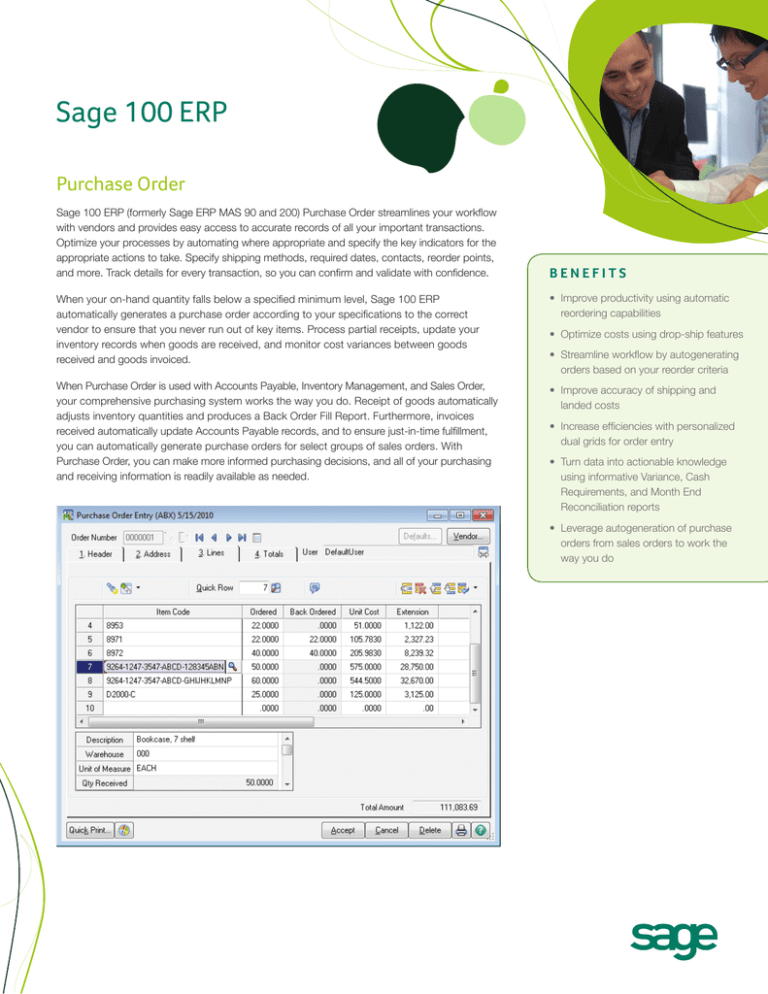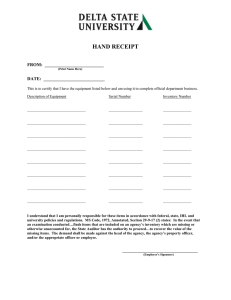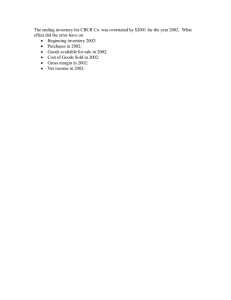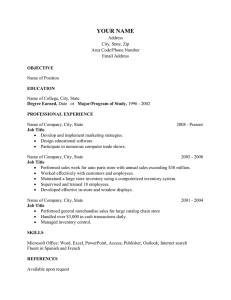
Sage 100 ERP
Purchase Order
Sage 100 ERP (formerly Sage ERP MAS 90 and 200) Purchase Order streamlines your workflow
with vendors and provides easy access to accurate records of all your important transactions.
Optimize your processes by automating where appropriate and specify the key indicators for the
appropriate actions to take. Specify shipping methods, required dates, contacts, reorder points,
and more. Track details for every transaction, so you can confirm and validate with confidence.
BENEFITS
When your on-hand quantity falls below a specified minimum level, Sage 100 ERP automatically generates a purchase order according to your specifications to the correct vendor to ensure that you never run out of key items. Process partial receipts, update your inventory records when goods are received, and monitor cost variances between goods received and goods invoiced. • Improve productivity using automatic
reordering capabilities
When Purchase Order is used with Accounts Payable, Inventory Management, and Sales Order,
your comprehensive purchasing system works the way you do. Receipt of goods automatically
adjusts inventory quantities and produces a Back Order Fill Report. Furthermore, invoices received automatically update Accounts Payable records, and to ensure just-in-time fulfillment,
you can automatically generate purchase orders for select groups of sales orders. With Purchase Order, you can make more informed purchasing decisions, and all of your purchasing
and receiving information is readily available as needed.
• Improve accuracy of shipping and landed costs • Optimize costs using drop-ship features
• Streamline workflow by autogenerating
orders based on your reorder criteria
• Increase efficiencies with personalized dual grids for order entry • Turn data into actionable knowledge
using informative Variance, Cash
Requirements, and Month End
Reconciliation reports
• Leverage autogeneration of purchase
orders from sales orders to work the way you do
Sage 100 ERP I Purchase Order
Features
Automatic Reordering
Purchase orders can be automatically generated for inventory items when on-hand quantities fall
below specified reorder levels.
Drop-Ship Orders
Purchase orders can be created for items shipped directly from the vendor to the customer. When
Purchase Order is integrated with the Sales Order module, the customer number and address
information can be automatically retrieved.
Material Requisitions
Requests for goods for internal use can be processed with purchase orders, and material requisition
orders can be printed.
Landed Cost Calculation
Landed cost information is entered in receipt of goods with an unlimited number of user-definable
costs for each general ledger clearing account. You can select any allocation method for each type
of cost, including freight allocation. You can calculate landed costs using the same method you
currently employ or based on the volume field in the item file.
Autogeneration of Purchase
Orders from Sales Orders
Purchase orders can be automatically generated for a selected range of sales orders. You can
control how the ordered items appear on the purchase order—either individually or summarized.
Receipt Labels
Receipt labels with bar codes can be printed for inventory items prior to the Daily Receipt Registers
Update when Purchase Order is used with the Inventory Management module.
Blanket and Repeating Orders
Large orders shipped over an extended period of time are efficiently managed. To speed the process
when you regularly order from the same vendor, easily establish a repeating order.
Alias Item Numbers
Inventory alias item numbers can be accessed throughout your system. When you select an alias
item number, the corresponding part number from your inventory list is automatically selected.
Use Tax
Purchase Order allows you to flag individual lines as Use Tax, track the tax to pay on items
purchased, then specify to expense the tax to inventory items.
Nonstock Items
Items that are not stocked in your inventory can be entered on purchase orders. Charges, such as
service fees, can also be entered for miscellaneous noninventory items.
Vendor Price Levels
Price schedules for specific vendors, product lines, or inventory items can be set up based on the
standard cost or a specified discount method.
Expected Delivery Report
All deliveries expected within a range of dates are listed on this report.
Back Order Fill Report
All Sales Order back orders, which can be filled as a result of goods received, are listed on this report.
Drill Down
When viewing an inventory item, you can drill down to lot and serial information from the receipt
history inquiry.
Cost Override
A cost override flag may be set in inventory for each product line and item, thus enabling changes
to costs of certain items during receipt of goods to be controlled. This feature can be password
protected for added security.
User-Defined Fields for Line Items
User-defined fields can flow from inventory items to sales order and purchase order lines and can be
printed on reports and forms. They can also be stored in history files and can appear on standard
purchase order reports.
Memo Manager
Selected vendor memos can be set to automatically pop up critical information, including
attachments that can be viewed during Purchase Order Entry, and will flow throughout the system.
©2012 Sage Software, Inc. All rights reserved. Sage, the Sage logos, and the Sage product and service names mentioned herein are registered trademarks
or trademarks of Sage Software, Inc., or its affiliated entities. All other trademarks are the property of their respective owners. 100_PO_DS 04/12
6561 Irvine Center Drive I Irvine, California 92618 I 866-530-7243 I www.Sage100ERP.com



